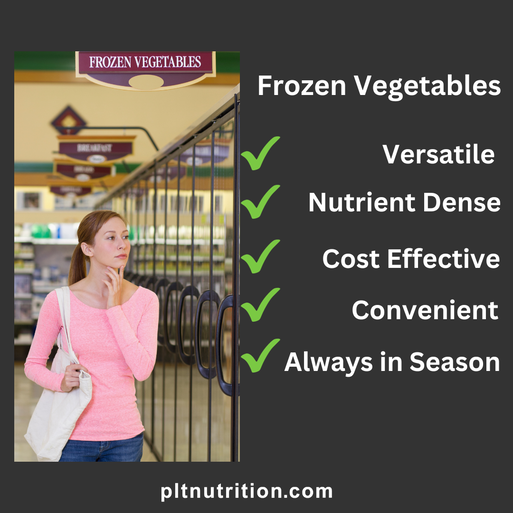|
Some of the most common questions people ask when considering a PLT Nutrition Coaching Plan are:
Q: Will I have to spend hours in the kitchen cooking elaborate meals from complicated recipes? Q: We have a large family and so budget is important when grocery shopping, do I need to buy all organic, fresh produce etc.? Q: I don’t like (or know how to) cook, will you help me with some simple ideas? At PLT, we encourage our clients to eat the foods they love AND to gradually improved the quality of their food choices. We talk about SIMPLE FOOD often, heck if you search #simplefood in the PLT Community, you will be inundated with meal/recipe ideas that will definitely NOT stress you out in the kitchen. A very basic recommendation for all:
Whilst fresh is awesome and you should definitely include some fresh veggies weekly if you can, many people find that they are constantly throwing away produce that has gone bad - we all dislike food waste and wasting our hard earned cash! Don’t turn your nose up at frozen please. Frozen vegetables offer several benefits that make them a convenient and nutritious option. Whether you are cooking for 1 or a family of 15, some important things to consider about the wall of veg in the frozen food department: Nutrient Retention: Frozen vegetables are often frozen shortly after harvesting, locking in their nutritional content. This process helps preserve essential vitamins, minerals, and antioxidants, ensuring that they remain available for consumption. Long Shelf Life: Frozen vegetables have a longer shelf life compared to fresh produce. This extended shelf life allows for convenient storage, reducing the risk of food waste. You can keep a variety of frozen vegetables on hand, making it easier to incorporate them into your meals regularly. Convenience: Frozen vegetables are incredibly convenient. They come pre-washed, pre-cut, and ready to use, saving you time on preparation. This convenience can be especially helpful for busy individuals or those with hectic schedules. Year-Round Availability: Frozen vegetables are available year-round, regardless of seasonal variations. This ensures a consistent and diverse supply of vegetables, allowing you to maintain a well-balanced diet throughout the year. Cost-Effective: Frozen vegetables are often more cost-effective than fresh produce, making them a budget-friendly option for those looking to maximize nutritional value without breaking the bank. Buying in bulk can further enhance cost savings. Reduced Food Waste: Frozen vegetables help reduce food waste since you can use only the amount you need and store the rest for later. This contrasts with fresh produce, which may have a shorter shelf life and be more susceptible to spoilage. Texture and Taste: The freezing process helps maintain the texture and taste of many vegetables. While some may soften slightly upon cooking, the overall quality is often comparable to fresh alternatives. Versatility: Frozen vegetables are versatile and can be easily incorporated into a variety of dishes. Whether you're adding them to yummy bowls, stir-fries, egg dishes, or side dishes, frozen vegetables provide flexibility in meal preparation. Availability of Mixes and Blends: Many frozen vegetable mixes and blends are available, combining different vegetables for added variety and convenience. These mixes can be tailored to specific recipes or preferences. Nutrient Density: Despite common misconceptions, frozen vegetables can be as nutrient-dense as, or even more so than, fresh vegetables that have been stored for an extended period. The quick freezing process helps preserve the vegetables at their peak nutritional state. Simple is best. Simple needn't be boring. Simple can be very budget friendly. Comments are closed.
|
AuthorI'm Paul Leonard, CEO & founder of PLT Nutrition. Categories
All
|
|
Current PLT Members
|
Quick Links
|
Connect With Us
|


 RSS Feed
RSS Feed
